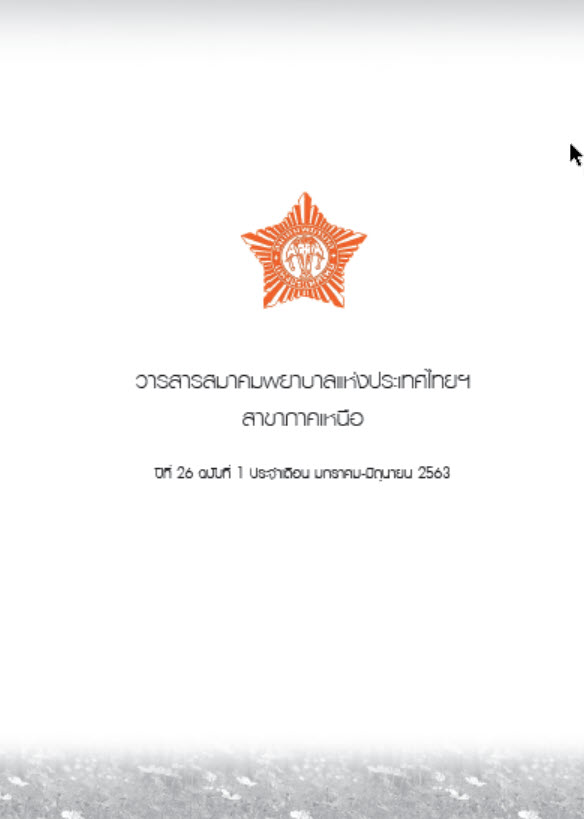ผลของการใช้เกมสูติศาสตร์พาเพลินออนไลน์ต่อความรู้ และความพึงพอใจของผู้เรียน
คำสำคัญ:
แบบจำลอง ADDIE, การศึกษาพยาบาล, การเรียนรู้โดยใช้เกมเป็นฐาน, คำศัพท์สูติศาสตร์บทคัดย่อ
การวิจัยกึ่งทดลองนี้มีวัตถุประสงค์เพื่อพัฒนาการเรียนการสอนพยาบาลโดยใช้เกมสูติศาสตร์ พาเพลินออนไลน์และศึกษาผลของเกมต่อความรู้และความพึงพอใจของผู้เรียน กลุ่มตัวอย่างเป็น นักศึกษาพยาบาล ชั้นปีที่ 2 คณะพยาบาลศาสตร์แมคคอร์มิค มหาวิทยาลัยพายัพ ที่ลงทะเบียนเรียน รายวิชาการพยาบาลมารดา และทารก (รหัสวิชา พบ. 221) ภาคการศึกษาที่ 2 ปีการศึกษา 2561 จำนวน 60 คน คัดเลือกกลุ่มตัวอย่างแบบเจาะจง แบ่งเป็นกลุ่มทดลองที่ได้เล่นเกมและกลุ่มควบคุม ที่ไม่ได้เล่นเกม กลุ่มละเท่า ๆ กัน เครื่องมือที่ใช้ในการวิจัยประกอบด้วย เกมสูติศาสตร์พาเพลิน ออนไลน์ที่สร้างขึ้นโดยใช้แบบจำลอง ADDIE แบบประเมินความรู้คำศัพท์สูติศาสตร์ และแบบวัดความ พึงพอใจ วิเคราะห์ข้อมูลด้วยสถิติเชิงพรรณา และสถิติค่าที (t -test)
ผลการวิจัยพบว่า ค่าเฉลี่ยคะแนนความรู้หลังเล่นเกมของกลุ่มทดลอง ผ่านเกณฑ์ ร้อยละ 75 คิดเป็นร้อยละ 93.33 กลุ่มทดลองมีค่าเฉลี่ยคะแนนความรู้หลังเล่นเกมสูงกว่าก่อนเล่นเกม (p < .001) กลุ่มทดลองมีค่าเฉลี่ยคะแนนความรู้สูงกว่ากลุ่มควบคุม (p < .001) และมีความพึงพอใจต่อการเล่น เกมโดยรวมอยู่ในระดับมาก ( = 4.13, S.D. =.62) เมื่อเวลาผ่านไป 1 เดือน ทั้งสองกลุ่มมีค่าเฉลี่ย คะแนนความรู้ลดลงจากเดิม (p >.001) อย่างไรก็ตามผู้เรียนกลุ่มทดลองยังมีค่าเฉลี่ยคะแนนความรู้ สูงกว่ากลุ่มควบคุม (p < .001)
เกมสูติศาสตร์พาเพลินออนไลน์สำหรับนักศึกษาพยาบาลเป็นสื่อที่มีประสิทธิภาพ ช่วยเรียนรู้และ จดจำคำศัพท์จากเกม ง่ายต่อการเข้าถึง เข้าศึกษาได้สะดวก ได้รับความสนุกสนาน และเป็นสื่อการ สอนที่เหมาะกับการศึกษายุคใหม่ในการเสริมสร้างการเรียนรู้ที่มีความต่อเนื่องทั้งในและนอกห้องเรียน
เอกสารอ้างอิง
สุดเฉลิม ศัสตราพฤกษ. การจัดการเรียนการสอนในศตวรรษที่ 21 แบบห้องเรียนกลับด้านเพื่อการพัฒนา ทักษะการเรียนรู้และนวัตกรรม. วารสารวิทยบริการ มหาวิทยาลัยสงขลานครินทร์. 2560; 28(1): 100-108.
ธนพล บรรดาศักดิ์, บุญสืบ โสโสม, กนกอร ชาวเวียง, นฤมล จันทรเกษม, กนกพร เทียนคำศรี และ สุนทรี สิทธิสงคราม. การเป็นผู้เรียนในยุคศตวรรษที่ 21: มุมมองจากอาจารย์และนักศึกษาพยาบาล. วารสารสันติศึกษาปริทรรศน์. 2558; 4(2): 175-198.
ทิศนา แขมมณี. 14 วิธีสอน สำหรับครูมืออาชีพ. พิมพ์ครั้งที่ 3. กรุงเทพฯ: จุฬาลงกรณ์มหาวิทยาลัย; 2545.
ฉัตรกมล ประจวบลาภ. Game-Based Learning กับการพัฒนาการเรียนการสอนทางการพยาบาล. วารสารกองการพยาบาล. 2559; 43(2): 127-136.
กัญญาพัชญ์ จาอ้าย. เกมสูติศาสตร์พาเพลิน. เชียงใหม่: ทีดีซายด์; 2556.
วัชรพล วิบูลยศริน. หลักการออกแบบการสอนบนเว็บตามแบบจำลอง ADDIE เพื่อการสอนสนทนา ภาษาไทยเบื้องต้นสำหรับชาวต่างประเทศ. วารสารศรีนครินทรวิโรฒวิจัยและพัฒนา (สาขา มนุษยศาสตร์และสังคมศาสตร์). 2557; 6(12): 192-204.
Burns, N., & Grove. S.K. The practice of nursing research: Appraisal, synthesis and generation of evidence. 6th ed. St. Louis, MO: Elsevier Saunders; 2009.
Kerlinger, Fred N. Foundations of Behavioral Research. 3rd ed. Orlando, Holt: Rinehart and Winston, Inc.; 1986.
เกณฑ์ความพึงพอใจต่อการจัดการเรียนการสอนรายวิชาในการประเมินการเรียนรู้ (learning outcome: LO) ของผู้เรียนของคณะพยาบาลศาสตร์แมคคอร์มิค มหาวิทยาลัยพายัพ. คณะพยาบาล ศาสตร์แมคคอร์มิค มหาวิทยาลัยพายัพ; 2562.
ณัฐวราพร เปลี่ยนปราน และสุทัศน์ นาคจั่น การเรียนรู้คำศัพท์ภาษาอังกฤษโดยใช้เกมประกอบการสอน ของนักเรียนชั้นประถมศึกษาปีที่ 6 โรงเรียนวัดทุ่งน้อย อำเภอกุยบุรี จังหวัดประจวบคีรีขันธ์. Veridian E-Journal. 2558; 8(2): 1672-684.
กรมวิชาการ. กระบวนการเรียนรู้และยุทธศาสตร์การเรียนรู้. กรุงเทพฯ: เดอะมาสเตอร์กรุ๊ปแมนเนจเม้นท์ จำกัด; 2551.
มนต์ชัย เทียนทอง. แนวคิดของเอบบิงเฮาส์ ในการออกแบบและพัฒนาคอร์สแวร์สำหรับบทเรียน คอมพิวเตอร์ช่วยสอน. กรุงเทพฯ: ศูนย์ผลิตตำราเรียน สถาบันเทคโนโลยีพระจอมเกล้าพระนครเหนือ; 2546.
ชัยวัฒน์ สุทธิรัตน์. 80 นวัตกรรมการจัดการเรียนรู้ที่เน้นผู้เรียนเป็นศูนย์กลาง. พิมพ์ครั้งที่ 3 กรุงเทพฯ: แดเน็กซ์ อินเตอร์คอร์ปอเรชั่น; 2553.
สกุล สุขศิริ. ผลสัมฤทธิ์ของสื่อการเรียนรู้แบบ Game based learning. กรุงเทพฯ: สถาบันบัณฑิต พัฒนบริหารศาสตร์; 2550.
ดาวรถา วีระพันธ์. ศึกษาการพัฒนาบทเรียนคอมพิวเตอร์ช่วยสอน เรื่อง พระราชบัญญัติว่าด้วยการกระ ทำความผิดเกี่ยวกับคอมพิวเตอร์ พ.ศ. 2550. วารสารบัณฑิตศึกษา มหาวิทยาลัยราชภัฏวไลยอลงกรณ์ ในพระบรมราชูปถัมภ์; 2560. 11(1): 44-54.
Hannig A, Kuth N, Ozman M, Jonas S, and Spreckelsen C. eMedOffice: A web-based col laborative serious game for teaching optimal design of a medical practice. BMC Med Educ. 2012; 12(1): 104-17.
อภิเชษฐ์ ขาวเผือก. การพัฒนาเกมการศึกษาบนแท็บเล็ตโดยใช้เทคนิคช่วยจำเพื่อส่งเสริมความคงทนใน การจำคำศัพท์ภาษาอังกฤษ สำหรับนักเรียนชั้นประถมศึกษาปีที่ 2 โรงเรียนวัดสะแกงาม. Veridian E-Journal. 2559; 9(2): 1416-431.
ดาวน์โหลด
เผยแพร่แล้ว
รูปแบบการอ้างอิง
ฉบับ
ประเภทบทความ
สัญญาอนุญาต
บทความที่ได้รับการตีพิมพ์เป็นลิขสิทธิ์ของสมาคมพยาบาลแห่งประเทศไทยฯ สาขาภาคเหนือ
เนื้อหาและข้อคิดเห็นใดๆ ที่ตีพิมพ์ในวารสารสมาคมพยาบาลฯ ถือเป็นความรับผิดชอบของผู้เขียนเท่านั้น ผู้เขียนบทความต้องศึกษารายละเอียดหลักเกณฑ์การจัดทำต้นฉบับตามที่วารสารกำหนด และเนื้อหาส่วนภาษาอังกฤษต้องได้รับการตรวจสอบจากเจ้าของภาษามาแล้ว


